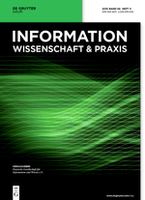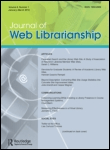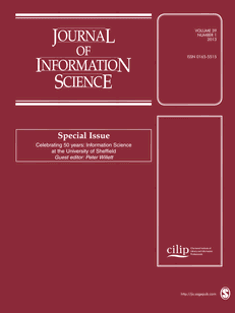
INFORMATION-WISSENSCHAFT UND PRAXIS
Scope & Guideline
Cultivating Knowledge at the Intersection of Theory and Application.
Introduction
Aims and Scopes
- Interdisciplinary Approaches to Information Science:
The journal encourages research that intersects with various fields such as education, social sciences, and technology, promoting a holistic understanding of information processes. - Information Literacy and Digital Competency:
A core focus is on enhancing information literacy among different demographics, including students and professionals, emphasizing the importance of critical thinking and evaluation of information sources. - Impact of Technology on Information Management:
The journal explores the implications of emerging technologies, particularly artificial intelligence and digital tools, on information management practices within organizations and libraries. - Historical Perspectives and Evolution of Information Practices:
Research often reflects on the historical development of information science, documenting milestones and changes in practices that have shaped the current landscape. - Quality Management and Ethical Standards in Information Science:
The journal addresses the challenges of maintaining quality and ethical standards in information practices, discussing frameworks and guidelines essential for professional integrity. - Research Data Management:
A significant emphasis is on the methodologies and practices surrounding research data management, particularly in light of open science and accessibility initiatives. - Public Engagement and Community Building:
The journal highlights the role of information professionals in fostering community engagement and facilitating access to information resources across diverse populations.
Trending and Emerging
- Artificial Intelligence and Information Science:
The integration of AI technologies into information science is a rapidly growing theme, with research focusing on the implications of AI for information retrieval, management, and user interaction. - Digitalization and its Impact on Research Management:
Increasing attention is being paid to the digital transformation of research management processes, including the challenges and opportunities presented by digital tools and platforms. - Fake News and Information Literacy:
As misinformation becomes a critical societal challenge, the journal has seen a rise in discussions around information literacy strategies to combat fake news, particularly in educational contexts. - Sustainability in Information Practices:
There is a notable trend towards exploring sustainability within information science, including practices aimed at promoting environmental responsibility and ethical considerations in information management. - Intercultural Perspectives on Information Literacy:
Emerging research is highlighting the importance of intercultural perspectives in understanding information literacy, reflecting a growing recognition of diversity in information needs and practices. - User-Centric Information Services:
A significant shift towards user-centered design and evaluation in information services is evident, with research focusing on understanding user needs and enhancing the user experience.
Declining or Waning
- Traditional Indexing and Cataloging Practices:
With the rise of automated systems and AI-driven indexing tools, traditional methods of indexing and cataloging are becoming less emphasized, reflecting a shift towards more dynamic and technology-driven approaches. - Focus on Print Media and Physical Libraries:
As digital resources and online platforms gain dominance, discussions surrounding print media and the role of physical libraries are increasingly viewed as outdated, leading to a decline in related publications. - Historical Documentation Practices:
While historical perspectives are still valuable, the frequency of papers solely focused on historical documentation practices has decreased, as the field prioritizes contemporary challenges and innovations. - Local and National Library Initiatives:
Research centered on local library initiatives is waning as there is a growing interest in global and international perspectives on information science, reflecting a broader scope of inquiry. - Library Science as an Isolated Discipline:
The notion of library science as a standalone discipline is diminishing, with a shift towards viewing it as part of a larger information ecosystem that includes various interdisciplinary interactions.
Similar Journals

Bibliotecas-Anales de Investigacion
Connecting Researchers with Library InsightsBibliotecas-Anales de Investigacion is a prominent scholarly journal dedicated to the field of Library and Information Sciences, published by BIBLIOTECA NACL CUBA JOSE MARTI, with its esteemed presence based in Havana, Cuba. This journal (ISSN: 0006-176X, E-ISSN: 1683-8947) plays a crucial role in disseminating research and insights relevant to the evolving landscape of library operations, information management, and user services. Acknowledged for its rigorous peer-review process, it is indexed in Scopus, currently classified in the 2023 Q4 quartile, ranking 199 out of 280 in its category, marking a significant contribution to the academic community despite its modest percentile of 29th. The journal welcomes original research articles, case studies, and reviews that explore contemporary issues and developments in library science, creating an inclusive platform for both seasoned scholars and emerging voices. Interested readers can anticipate a robust exploration of topics from information retrieval to digital libraries, aligning with the journal's objective to enhance knowledge and practice within the library and information sector. As the journal converges its themes from 2019 to 2024, it remains a vital resource for researchers, professionals, and students aiming to stay informed on the latest trends and innovations in the field.

LIBRARY AND INFORMATION SCIENCE
Empowering librarianship through innovative research.LIBRARY AND INFORMATION SCIENCE is a specialized academic journal dedicated to the advancement of knowledge and scholarship in the field of library and information sciences. Published by MITA SOC LIBRARY INFORMATION SCIENCE, this esteemed journal has been a crucial platform for scholarly communication since 1980, addressing the dynamic challenges and developments in the information landscape. Although it holds a Q4 category ranking in the Library and Information Sciences according to the 2023 Scopus Ranking, the journal serves a unique niche, providing insights and fostering discussions among a diverse audience of researchers, professionals, and students. With no Open Access options currently available, its valuable research contributions are accessible through institutional subscriptions and library access. The journal aims to disseminate innovative research, case studies, and theoretical explorations that enhance our understanding of information behavior, retrieval systems, library management, and emerging technologies, thus promoting an informed society in an increasingly digital world. Given its focused scope and enduring presence, LIBRARY AND INFORMATION SCIENCE continues to be an essential resource for anyone invested in the future of libraries and information services.

Journal of Web Librarianship
Advancing the Frontiers of Digital LibrarianshipWelcome to the Journal of Web Librarianship, an esteemed publication dedicated to the evolving landscape of library science and information technology. Published by Routledge Journals, Taylor & Francis Ltd, this journal serves as a vital platform for researchers and professionals to share innovative practices, methodologies, and research findings in the fields of Library and Information Sciences and Computer Science Applications. With an impressive impact factor reflected in its 2023 rankings—Q1 in Library and Information Sciences and Q2 in Computer Science Applications—the journal is well-positioned to influence the discourse and development within these disciplines. Since its inception in 2007, the Journal of Web Librarianship has continually contributed to the academic dialogue, ensuring a comprehensive understanding of the critical role that web technologies play in library services. Though it is not an open-access journal, it remains an invaluable resource for those dedicated to advancing the practice and theory of web librarianship. Join us in exploring the intersections of information and technology as we work towards a more informed society.

Malaysian Journal of Library & Information Science
Elevating Scholarly Dialogue in Information SciencesMalaysian Journal of Library & Information Science, published by the University of Malaya, Faculty of Computer Science & Information Technology, serves as a crucial platform for researchers, professionals, and students in the field of Library and Information Sciences. With a commitment to advancing scholarly knowledge, this journal has consistently showcased significant research contributions since its inception in 1996, and is currently indexed in Scopus, ranking in the 62nd percentile among its peers. The journal's Q2 categorization reflects its growing impact and relevance in the scholarly community. Although it operates as a traditional subscription-based journal, the publication holds great importance for those looking to delve into innovative practices and emerging trends within library and information sciences. Researchers and practitioners can access valuable insights that contribute to a deeper understanding of the evolving landscape in Malaysia and beyond. Addressed from Kuala Lumpur, Malaysia, the journal welcomes contributions that further exploration and scholarship in the vital field of information dissemination and management.

JOURNAL OF INFORMATION SCIENCE
Exploring the frontiers of information management and systems.JOURNAL OF INFORMATION SCIENCE (ISSN: 0165-5515; E-ISSN: 1741-6485), published by SAGE PUBLICATIONS LTD, stands as a leading academic journal in the realms of Information Systems and Library and Information Sciences. Established in 1979 and continuing through 2024, this journal has become a cornerstone for researchers, professionals, and students seeking to enhance their understanding of the rapidly evolving landscape of information management. With a commendable Q1 ranking in Library and Information Sciences and a Q2 ranking in Information Systems as of 2023, it demonstrates significant influence, evidenced by its 89th percentile ranking in Scopus for Social Sciences. Although it currently does not offer open access, the journal is committed to delivering high-quality, peer-reviewed research that addresses both theoretical and practical challenges in the field. Researchers and practitioners alike will find invaluable insights that bolster their work and contribute to the broader academic dialogue surrounding information science.

Transinformacao
Connecting scholars and practitioners to enhance understanding and practices.Transinformacao is a distinguished academic journal published by Pontificia Universidade Catolica Campinas in Brazil, focusing on the interdisciplinary fields of Communication, Information Systems, Library and Information Sciences, and Museology. With a commitment to advancing knowledge and fostering scholarly dialogue, the journal spans coverage from 2010 to 2023 and has been categorized in various quartiles, reflecting its growing influence; it holds a Q3 ranking in Communication and Library and Information Sciences, and a Q4 ranking in Information Systems. This positioning demonstrates the journal's relevance within the academic community, appealing to researchers, professionals, and students invested in these dynamic fields. Although it does not currently offer open access publishing, Transinformacao provides critical insights and findings valuable for those pursuing innovative research, striving to enhance practices and understanding within their disciplines. Located in Campinas, SP, the journal continually seeks to engage with emerging trends and robust methodologies, contributing meaningfully to academic discourse.

African Journal of Library Archives and Information Science
Elevating Archives, Enriching Communities.The African Journal of Library Archives and Information Science (ISSN: 0795-4778; E-ISSN: 0795-4778) is a pivotal publication in the field of Library and Information Sciences, published by ARCHLIB & INFORMATION SERVICES LTD in Nigeria. With a focus on the diverse and evolving challenges faced by libraries and information professionals in the African context, this journal serves as a platform for scholarly communication, fostering innovation and collaboration among researchers, practitioners, and academics. The journal has a notable impact factor, reflected in its Q3 ranking within the category for 2023, and is indexed in Scopus, holding a percentile rank of 22nd in its field, further validating its relevance and scholarly contribution. Running since 2008 with continual publications through to 2024, the journal aims to advance knowledge, share best practices, and highlight emerging trends in librarianship and information science across Africa and beyond. By offering open access options, it ensures wide dissemination of knowledge, making it an essential resource for those dedicated to enhancing information services and archives.

Collection and Curation
Pioneering Research in Library SciencesCollection and Curation is a prominent academic journal published by EMERALD GROUP PUBLISHING LTD, dedicated to the fields of Library and Information Sciences and Museology. With a significant impact in its domains, the journal has achieved a category quartile ranking of Q3 in Library and Information Sciences and Q2 in Museology as of 2023. It is noteworthy that in the Scopus rankings, it stands at an impressive #8 out of 83 in Museology, placing it in the 90th percentile, while also ranking #112 out of 280 in Library and Information Sciences, positioning it within the 60th percentile. Since its inception in 2018, the journal has been instrumental in advancing research and discussion around the critical themes of collection development and curation methodologies. Although it currently does not offer open access, the journal's rigorous peer-review process ensures high-quality scholarly contributions that are indispensable for researchers, professionals, and students aiming to enrich their understanding and practices in these important fields. By focusing on innovative strategies, practices, and case studies, Collection and Curation continues to shape the future of information management and museum studies.

Anales de Documentacion
Advancing Knowledge in Library and Information SciencesAnales de Documentacion is a distinguished open-access journal published by UNIV MURCIA, contributing significantly to the field of Library and Information Sciences since its inception in 1998. With a focus on the dissemination of innovative research and studies, this journal serves as a vital resource for researchers, professionals, and students engaged in the dynamic landscape of documentation and information management. Although coverage in Scopus was discontinued from 2013 to 2020, the journal continues to hold its place in the academic community, ranking #167 out of 227 in the Social Sciences category, reflecting its commitment to quality and relevance. The journal's accessibility enhances its utility, making vital research available to a broad audience, thereby fostering collaboration and scholarly exchange in the evolving discourse of information sciences. Its address at the Edificio Pleiades on the Campus de Espinardo in Murcia, Spain, further signifies its role as a central hub for academic inquiry and exploration in this essential field.

Perspectivas em Ciencia da Informacao
Exploring the forefront of information research.Perspectivas em Ciencia da Informacao is a premier academic journal published by Universidade Federal de Minas Gerais, specifically from the Escola de Biblioteconomia. Since its inception in 2006, this Open Access journal has become a vibrant platform for disseminating research in the fields of Library and Information Sciences, Information Systems, Communication, and Museology. With a reputation bolstered by its classification in multiple quartiles—ranging from Q2 to Q4 in 2023—this journal stands out in the Brazilian academic landscape, providing valuable insights and supporting knowledge development for researchers, professionals, and students alike. Its impact is further underscored by its inclusion in Scopus, where it ranks within the lower percentiles of its categories, highlighting its potential for growth and increasing relevance in the scholarly community. The journal aims to explore emerging trends and significant issues in information science, facilitating an essential dialogue among scholars and practitioners to propel the field forward.